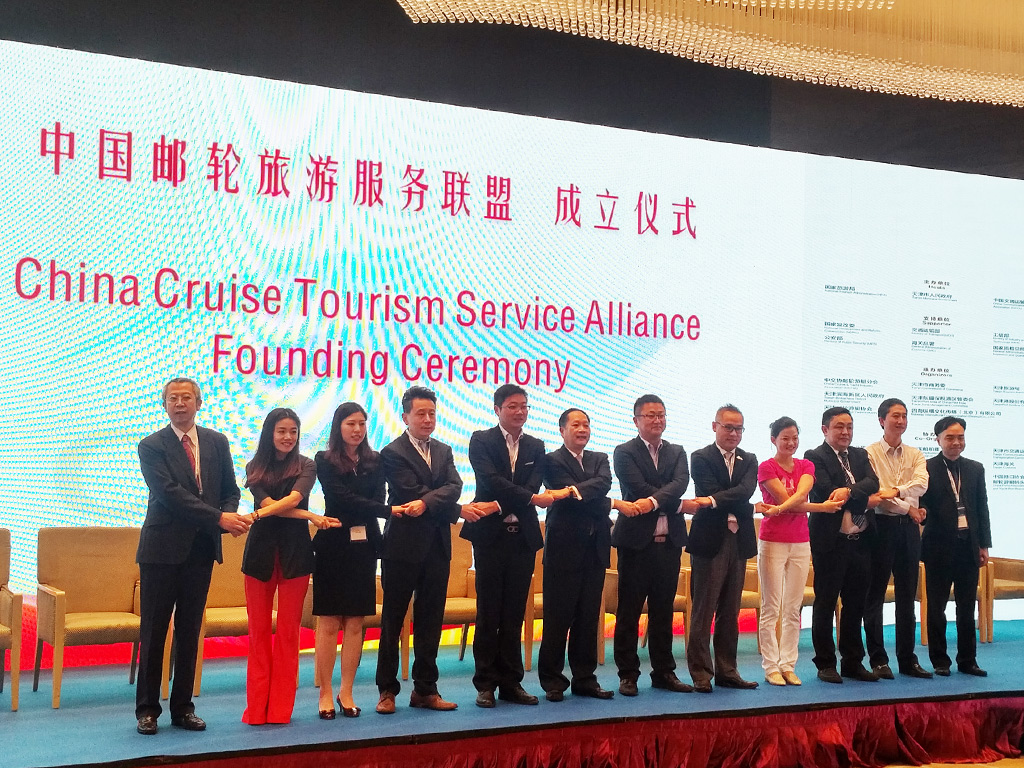The China Cruise Tourism Service Alliance was officially launched on Saturday by the China Cruise and Yacht Industry Association at China Cruise Shipping in Tianjin, bringing together travel agents, online travel agencies and other cruise service organizations.
The alliance aims to combine these key parties to work on issues and pricing in the Chinese market, providing a forum for discussion. Cruise companies are not invited to the alliance.
“It’s a pleasure to be part of this family,” said one online travel agency representative, who added he sourced 160,000 homeport passengers in China in 2016. “The development speed has been rapid from 2012 to now. What we need to step up is the port services and shore excursion products so they can match the (quality) of the ship experience.”
Yudeng Gao, Tianjin Tourism Group Cruise Travel, said onboard entertainment needs to be improved and tailored to the local market.
Wenbing Jiang, assistant general manager, Caissa Cruises, said agents need to concentrate on developing smaller cities in China as source markets.
Kate Ni, general manager of outbound travel for Lvmama.com, explained that the company started selling cruises in 2007 and chartered its firs ship just two years later.
“Back then it was extremely difficult to market cruises,” she said, adding Lvmama.com will charter a total of 34 ships in 2016. “Since then the business has evolved and it’s good to see this alliance being put in place for support and thought sharing.”
Jianbin Liu, general manager of cruise for Tuniu.com, said his company was late to the cruise business, starting to charter ships in 2015.
“One thing we feel that is an issue is the fluctuation of price in charter rates,” he said. “In the past supply was less than demand, so chartering made money, but recently we started talking to each other about how much money we have been losing on charters. There needs to be improvement in onboard activities and events providing added value to passengers.”
Liu said inland cities must be developed as source markets to help keep up with capacity growth in China. He said Tuniu was already providing busses for passengers coming from inland cities in China, and next on his list was to develop stronger fly/cruise products for Chinese passengers.
“Currently about 30 percent of passengers are from cities outside the homeport cities,” Liu continued. “We have to provide better access and transportation to these passengers. Charterers should be thinking about this.”
Ximing Pan, managing director, Shenzhen Professional Workers International Travel Service, pointed at cruise lines not delivering a product as promised, resulting in angry passengers refusing to disembark.
“We are not the only ones to blame,” said Pan. “We bring the passengers to the ships and there is little we can do when there are dissatisfied customers aboard.”
Pan said he hopes the alliance will come up with a code of rights for travel agents.
Pan also mentioned weather issues, such as typhoons, causing ships to skip or replace ports, also causing delays and cancellations, but noted weather systems can be predicted in advance, even by two or three days.
“When cruise companies know that, they should inform us so we can inform passengers,” Pan said. “This saves them the trouble of going to the port and finding out the cruise is cancelled.”




